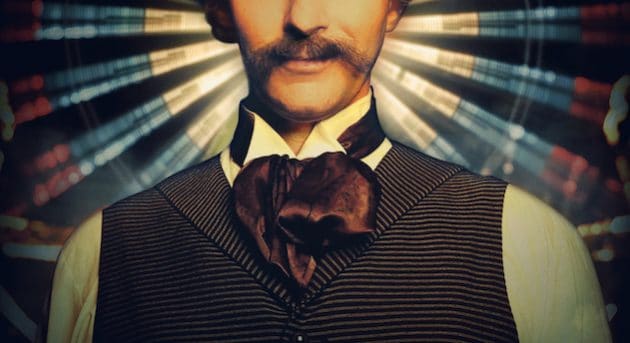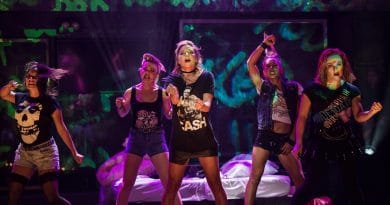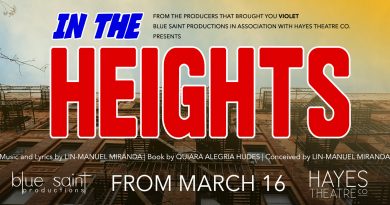Assassins at The Hayes
Stephen Sondheim’s Assassins stirred up controversy at the time of its inception in 1991. With a book by John Weidman, it centres around the assassins who killed presidents of the United States – no doubt a contentious subject. But through a chorus of voices, it marks a questioning of the disillusionment associated with patriotic idealism; the flaws in a system that elevates individual rights. So timely these queries need to be asked in the 2017 political climate, and so right that it signifies the first Sondheim musical the Hayes Theatre has programmed. Director Dean Bryant impressively shakes up this production with an innovative twist, culminating into one of the most spectacular designs that the space has seen.
 Picture a rundown carnival setting. There’s a dodgem car, fluorescent light bulbs hanging from the ceilings, and glowing gaming signs, arrows pointing down onto the subjects of the show. It is a perfect fit for the opening number, “Everybody’s Got the Right”, as the Proprietor (Rob McDougall) hands each of the assassins a gun at this funfair shooting gallery. Photos of presidents are hung on a wire that stretches across the stage: the Proprietor picks and chooses a photo as eleven assassins recount their motives behind shooting the presidents.
Picture a rundown carnival setting. There’s a dodgem car, fluorescent light bulbs hanging from the ceilings, and glowing gaming signs, arrows pointing down onto the subjects of the show. It is a perfect fit for the opening number, “Everybody’s Got the Right”, as the Proprietor (Rob McDougall) hands each of the assassins a gun at this funfair shooting gallery. Photos of presidents are hung on a wire that stretches across the stage: the Proprietor picks and chooses a photo as eleven assassins recount their motives behind shooting the presidents.
Bryant doesn’t leave this circus backdrop alone, even after the first number has concluded. He cleverly runs through with the concept, playfully crafting his musical numbers around it – and it’s absolutely electrifying. The performances spark, at times literally, in one song “How I Saved Roosevelt” where Giuseppe Zangara (Martin Crewes), a man who attempts to assassinate President Roosevelt because of his “stomach pains”, is electrocuted in an electric chair. He becomes entangled by the very same festive bulbs that hung above him previously. Those LED lights then become utilised as a skipping rope in “I Am Going to the Lordy” – a dynamically choreographed number, in which Charles Guiteau (Bobby Fox) (so convinced that he should be made Ambassador to France that he shoots President Garfield) no longer dances towards the noose to his death – but jumps through the rope tirelessly. The energy is boundless.
But it’s all fun and games…until it’s not. There’s a darker meaning that surfaces beyond this circus aesthetic – one that emerges within the black humour of Sondheim’s lyrics, asking whether the privileged have the right to feel oppressed. In the Hayes production, guns are positioned deliberately as toys, turning their assassins into cartoonish images. They are manic – incapable of being reasoned with. However, while there are moments where Bryan attempts to cast a clear critical eye onto the assassins themselves (a Housewife wails at the death of a President as the assassins close in on her in a reprise of the chilling opening number), there’s an ambiguousness in the musical’s stance on its subjects. By giving their assassins a voice, it borders on humanising them. Particularly, there’s a tendency to sympathise with Czolgosz, who suffers as part of the working class, shattering illusions of the America as the “land of opportunity”. It legitimises their absurd claims to murder, and Bryant’s direction has not exactly solved this complex dilemma in Weidman’s occasionally clunky book.
The performances in this show are excellent still. Campbell gives a throaty, sinister portrayal of John Wilkes Booth. Recent graduate Maxwell Simon as the Ballader is charming – he skillfully strums his guitar with a mischievous glint in his eye, mocking Booth’s true intentions behind Lincoln’s assassination. Even more admirable is when he turns around to give a flipside of his character as depressed, quietly dangerous Oswald. The number ‘Something Just Broke’ punches as a climax, and Simon’s doubling of character suggests everyone on the stage is as culpable as each other – unable to escape both the pros and cons of a country that preaches freedom.
The lighting and set design by Alicia Clements (set and costumes) and Ross Graham (lighting) transform the stage into a carnival-esque, dazzling ride, and it’s by far one of the best designs in the Hayes space yet. Andrew Worboy’s musical direction is wondrous, extracting the woodwinds and brass out of the orchestration – it’s instead replaced by nostalgic, calliope-like sounds: it blends right in Bryant’s bazaar inventive spin of the fairground.
The Hayes’ production isn’t afraid to comment on today’s political climate either, and cheeky references to Trump make the rhetoric of “the country is not what it was” more impactful, the assassins’ burning rage more relatable. Assassins is a technical achievement for the Hayes, and if this is only their first take on a Sondheim, we should have much to look forward to.



